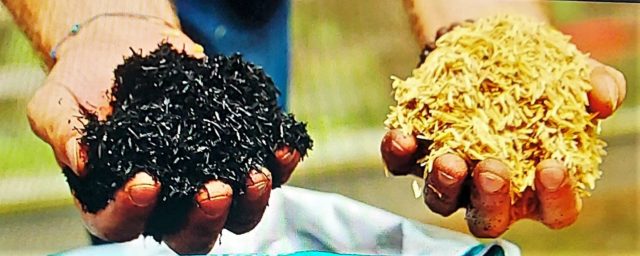PALAYAN CITY – Biochar has proved to be a revelation to Lauro Medina, a farmer from Nueva Ecija, the acknowledged “Rice Granary of the Philippines.”
He observed that rice seedlings or “punla” to which biochar had been applied when transplanted are “shock-resistant and germinate quickly,” with their leaves turning green “immediately” unlike in the past when he just relied on additives that were available.
Medina also noted that biochar also makes rice “more robust” when employed on the growing grains, “significantly larger” than those that were untreated with what the producer of biochar has described as a breakthrough and “sustainable” soil amendment.
Also, according to Medina, “grain stalks were larger and the grains were fuller” when enhanced with biochar.
This year – “thanks to biochar” – he eventually produced 24 cavans of rice from 2,644 square meters to which the crop had been planted with an average of 59 kilos per cavan.
“In the past and based on my long years of farming, I only made 21 cavans of rice with an average of 50.75 kilos from a 2,900 square-meter plot,” Medina said. “So, I truly believe that using biochar in my farm helped increase the yield by almost one metric ton per hectare.”
The biochar maker, Alcom Carbon Markets Philippines (ACMP) is a subsidiary of Alcom Pte Ltd., a Singapore-based renewable energy company specializing in carbon-removal projects.
It has partnered with the provincial government of Nueva Ecija to produce biochar in the province and possibly promote the product later in other rice-producing parts of the country as well.
Biochar, according to ACMP, which introduced it into the country, is an environment-friendly soil amendment made from rice husks (ipa) usually disposed of mainly through indiscriminate burning outside rice mills or left to rot elsewhere.
In 2021, the Philippines was reported to have produced 19.96 million metric tons of rice, indicating an increase over the previous year. With this great amount of the grain comes an equally huge quantity of rice husks that are a by-product of the harvest and a big issue for the industry.
Jefrey Disameto, another Nueva Ecija farmer, noted that his fellow growers just leave the rice husks outside rice mills and the husks are usually burned shortly by millers in order to decongest their plants.
Dr. Claro Torres, chief agriculturist of ACMP, said burning involves oxygenation that produces a by-product that is basically ash. “During the process, we can expect that elemental components of the rice husks are converted into gases that enter the atmosphere. With complete burning, you release carbon dioxide, one of the greenhouse gases that contributes to heating of the atmosphere leading to climate change.”
Rice husks are made up of carbon, water, silica, cellulose and lignin.
According to Torres, “global environmental and health issues” are brought by the burning of the rice husks, an approach that is deemed cost-effective by many farmers and millers but, he pointed out, not only produces smoke but also breathes out “health-hazardous chemicals.”
ACMP said it has been recommending biochar not only for rice but also onion and calamansi (Philippine lime) farms, also observing that limes cultivated in soil infused with biochar grow 30% larger than those without it.
With the mission of protecting the environment from global warming and climate change, Alcom Pte Ltd. founder Prateek Tiwari said the company at the same time helps local communities in the Philippines by providing jobs to farmers and teaching them sustainable agricultural practices.
The very practices adopted by farmer Medina and getting all too happy with the results.
He said biochar has proved to be effective in reducing adverse effects of heavy metals in plants, increasing water retention three to five times and improving soil permeability and aeration.
Concluding that biochar is an eco-friendly soil enhancer and a sustainable nature-friendly soil amendment, Medina pointed to his increased rice harvest that he said would not have been made possible by other fertilizers in the market today.
This output, according to Rodeo Nunez Jr., lawyer and managing director of ACMP, “demonstrated that using biochar widely and extensively is highly advantageous for both agricultural and climatic systems, making it a viable tool for regenerative agriculture.”





